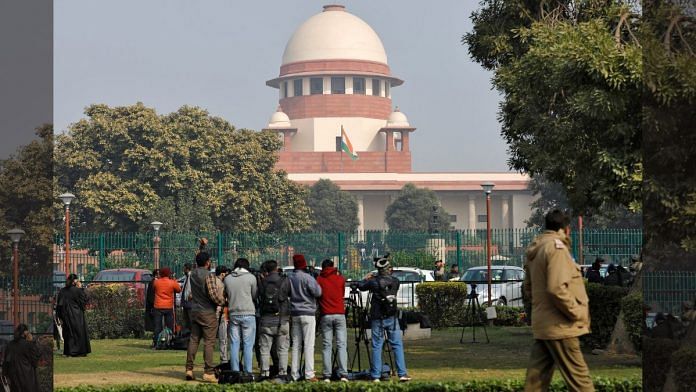New Delhi: Senior officials in India’s government have said they want to have a bigger role in choosing judges, a demand several lawyers and judges say threatens the independence of the judiciary.
Judges for the Supreme Court and the 25 high courts across India are appointed through a quarter-century-old mechanism that involves both sitting judges and government officials. A group of senior judges, known as the collegium, puts up candidates’ names to the law ministry, and these names are approved if they clear security checks.
A senior law ministry official said the government is seeking a role in selecting the candidates and was not satisfied with only being involved at the concluding stage. The official declined to be named because he was not authorised to speak to the media.
The government has recently held back on approving several candidates, without giving a reason.
The law minister said in the upper house of the parliament in December that 165 high court judges were appointed last year against 331 vacancies.
Recently, the government told the Supreme Court that 44 more judges were likely to be appointed this month.
Law Minister Kiren Rijiju has said the current system of appointing judges was opaque. “I am not critical about the judiciary or the judges, but I state a fact which is the reflection of the thinking of the common people of India,” he told a news channel.
This week Rijiju’s office said the minister was waiting for a response from the chief justice, the country’s highest judge, to the government demand to review the structure of the collegium. A bill passed by parliament to change the process was rejected by the Supreme Court in 2015.
The dispute has exacerbated a shortage of high court judges and a backlog of cases. Official data shows 4 out of every 10 judicial seats are currently empty, and there are over 70,000 cases pending before the Supreme Court and over 5.9 million cases before the high courts.
Several lawyers and retired judges told Reuters they believed the government was seeking to influence the judiciary, which would be unconstitutional.
“We are seeing the legislative authority trying to become the supreme power,” said N.Santosh Hegde, a former Supreme Court judge and a former Solicitor General. “The collegium system may not be completely perfect but it is not unfair.”
Two lawyers affiliated with Prime Minister Narendra Modi’s ruling party said the government was trying to end favouritism. The lawyers declined to be named because they were not authorised to speak to the media since the law minister, a member of the ruling party, was already addressing the issue.
One of the candidates who was not approved, lawyer Nagendra Ramachandra Naik, told Reuters he was rejected 4 times for a seat on Karnataka’s High Court.
“I don’t have a criminal record and my 30 years of work as a lawyer qualifies me for the position of a judge,” he said. When asked about Naik’s case, a senior law ministry official said the government’s decisions about appointments are confidential.
(Reporting by Rupam Jain, Arpan Chaturvedi in New Delhi, Editing by Miral Fahmy and Raju Gopalakrishnan)
Disclaimer: This report is auto generated from the Reuters news service. ThePrint holds no responsibilty for its content.
Also read: Journalists not exempted from disclosing sources if it helps criminal probe, says Delhi court



